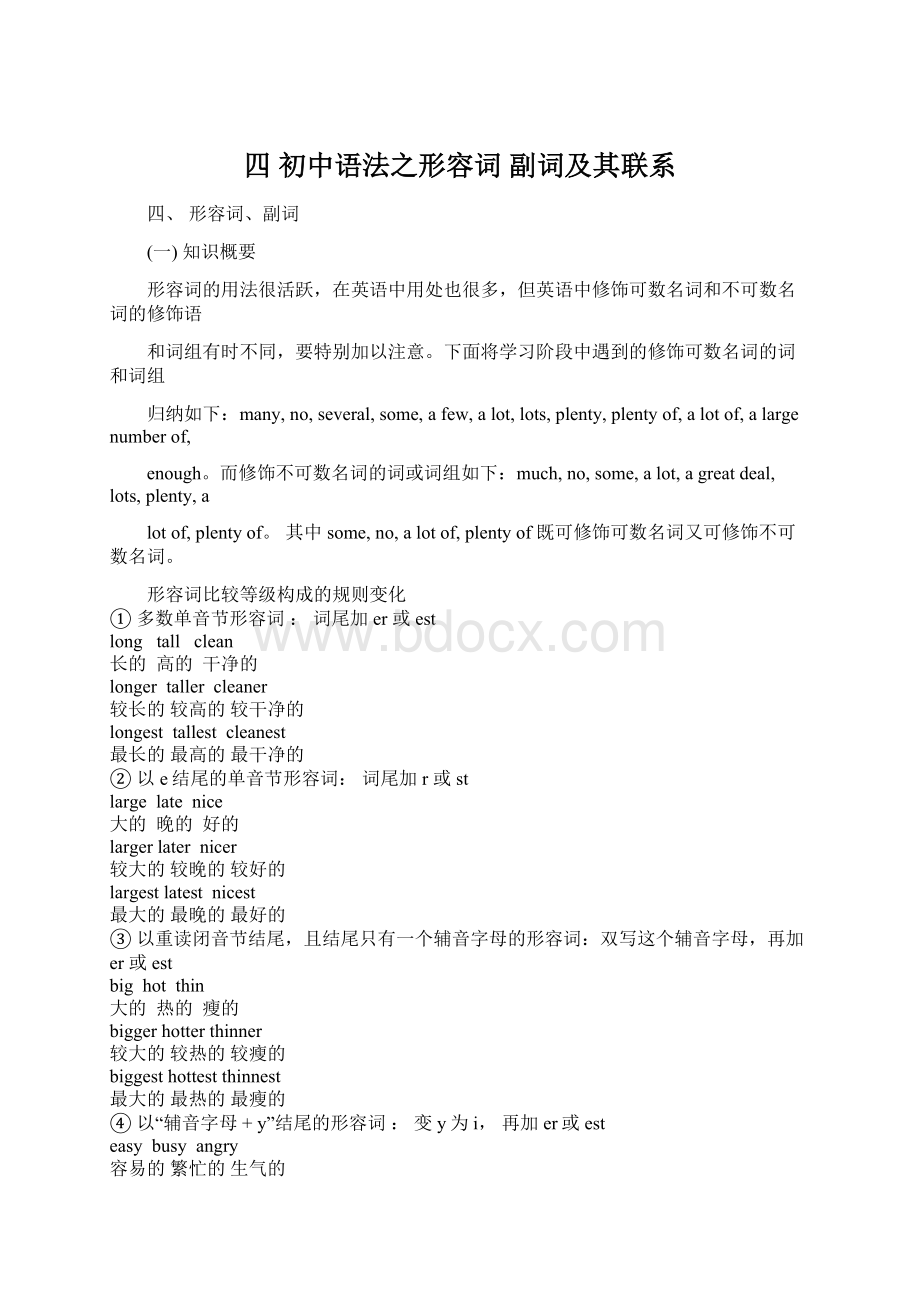四 初中语法之形容词 副词及其联系Word格式.docx
《四 初中语法之形容词 副词及其联系Word格式.docx》由会员分享,可在线阅读,更多相关《四 初中语法之形容词 副词及其联系Word格式.docx(21页珍藏版)》请在冰豆网上搜索。

较大的较热的较瘦的
biggesthottestthinnest
最大的最热的最瘦的
④以“辅音字母+y”结尾的形容词:
变y为i,再加er或est
easybusyangry
容易的繁忙的生气的
easierbusierangrier
较容易的较忙的较生气的
easiestbusiestangriest
最容易的最忙的最生气的
⑤两个或两个以上音节的形容词:
more/most+形容词原级
beautifulimportant
美丽的重要的
morebeautifulmoreimportant
较美的较重要的
mostbeautifulmostimportant
最美的最重要的
不规则变化的形容词或副词:
原级比较级最高级
goodbetterbest
Wellbetterbest
badworseworst
badlyworseworst
manymoremost
mostmoremost
littlelesslest
farfartherfarthest(距离上)
furtherfurthest(程度上)
oldolderoldest
eldereldest
要注意的是许多形容词同时又是副词,如:
back,all,alone,either,far,high,slow等。
而有些
形容词则要经过一定变化才能转为副词,其规律如下:
1.一般加ly
形容词副词
carefulcarefully
kindkindly
2.词尾是y时将y变成i加ly
HappyHappily
Busybusily
Easyeasily
3.其他
Truetruly
Terribleterribly
Fullfully
Possiblepossibly
Shyshyly
Wholewholly
此外并不是所有副词都可以修饰比较级和最高级形容词。
能修饰比较级的有:
much,yet,far,
still,agreatdeal,even和alittle.能修饰最高级的有:
thevery,muchthe,far等。
(二)正误辨析
[误]Theyounglikesplayingfootballverymuch.
[正]Theyounglikeplayingfootballverymuch.
[析]定冠词加形容词表示一类人,应作复数看待。
而定冠词加形容词表示抽象事物时则
要看作单数,如:
Thebeautifulisnotalwayskindness.美丽并不总代表善良。
[误]Sheisawarmheartwoman.
[正]Sheisawarmheartedwoman.
[析]英语形容词的构词法很多,其中之一是由形容词,加名词加ed构成,如:
warmhoarted热心肠的,whitehaired白毛的
[误]Thereisanalivefishinthepool.
[正]Thereisalivingfishinthepool.
[析]以a字母开头的形容词一般不能作定语,只能作表语。
如:
Thefishisalive.(鱼还活着)这样的形容词有:
alive,alike,alone,asleep,afraid,awake等。
[误]Theillmannearlydied.
[正]Thesickmannearlydied.
[析]ill一般不作定语来形容某人有病,而要用sick,但作表语时则都可以。
Heisill/
sick,ill作定语时则另有他意,如:
illluck(厄运),illnature(天性恶劣),illtemper(心绪不好)
[误]Ihaveimportantsomethingtotellyou.
[正]Ihavesomethingimportanttotellyou.
[析]不定代词something,anyone,somebody…在用形容词修饰时,形容词应放其后(something,anyone,somebody…+形容词)。
但要注意thing则不是不定代词,不符合上述规律。
Ihaveanimportantthingtotellyou.
[误]I'
llbefreeonnextSunday.
[正]I'
llbefreenextSunday.
[析]在表达将来时的时候:
nextSunday,nextweek,nextyear或lastSundaylastweek,last
year前都不加介词。
[误]TheforeignerslikethoselittlebeautifulChinesepaintings.
[正]TheforeignerslikethosebeautifullittleChinesepaintings.
[析]在名词前若有几个形容词作修饰语时,其顺序如下。
1.指示代词,定冠词2.数量词3.性质词4.大小5.形状6.老少,新旧7.颜色8.材
料但要注意的是英语的习惯是一个名词前的形容词一般不要多于三个。
Whataprettylittlewhitehorse!
ThosefirstfewshortEnglishstorieswerenotdifficulttounderstand.
[误]ThebestwaytolearnEnglishgoodistospeakwithEnglishmaneveryday.
[正]ThebestwaytolearnEnglishwellistospeakwithEnglishmaneveryday.
[析]good是形容词,这里是修饰动词speak的,所以应用副词well,但well作形容词讲时只作身体好。
Heiswell.(他身体很好)。
Heisgood.(他是个好人)。
[误]Thechildrenplayonthegrassnappyly.
[正]Thechildrenplayonthegrasshappily
[析]多音节y结尾的形容词变为副词时应将y变为i再加ly.
[误]Theteacherlookedangryatthestudents.
[正]Theteacherlookedangrilyatthestudents.
[析]英语中感观动词后面要接形容词,这时它是修饰主语的,如:
Thefoodsmellsgood.
食物闻起来很香。
Theteacherlookedangry老师看起来很生气。
而此句的意思为:
"
老师
生气地看着学生"
,所以应用副词形式。
[误]Heworkedwithmefriendly.
[正]Hewasfriendlytome.
[析]不是所有结尾是ly的词都是副词,但friendly是形容词,这样的词还有lovely,lonely,
costly,lively…monthlyweekly…。
但其中有些词既是副词,又是形容词,如:
early,hourly,
monthly…
[误]Youcanspeakfreeinfrontofyourfriends.
[正]Youcanspeakfreelyinfrontofyourfriends.
[析]free作为形容词意为"
自由的,有空闲的,免费的"
。
作为副词讲则是"
免费"
之意。
而freely作为副词则是"
自由的,随便的"
这些要注意的词还有:
hard努力,艰苦hardly几乎不late迟,晚lately最近的,最新的near近nearly几乎like像likely几乎
[误]Theymusthavearrivedtillnow.
[正]Theymusthavearrivedbynow.
[析]bynow是用于表达到目前为止某一动作已经发生。
musthave+过去分词是对过去某一事情所作的肯定推测。
llbebackatthemoment.
llbebackinamoment.
[析]atthemoment其意为"
现在,当时"
,而inamoment意为"
马上过一会"
,与inaminute
意思相近。
[误]ThetrainfromShanghaiwillarrivehereintime.
[正]ThetrainfromShanghaiwillarrivehereontime.
[析]ontime为"
准时"
,而intime有两个含意。
其一是"
及时"
,如:
Thedoctorarrivedintime。
其二是"
将来,终究"
[误]Imetanoldfriendsometimeslastmonth.
[正]Imetanoldfriendsometimelastmonth.
[析]Sometime过去,或者将来某时。
Sometimes有时如:
SometimesIgotoschoolbybus.
Sometime一些时间如:
Ineedsometimetodomyhomework.
Sometimes几次如:
IwenttoShanghaisometimesthismonth.
attimes有时,偶尔atalltimes经常someothertime改天
[误]Ihadmetanoldfriendthreedaysago.
[正]Ihadmetanoldfriendthreedaysbefore.
[正]Imetanoldfriendthreedaysago.
*ago用在时间状语中时,主句中谓语动词一般用过去时,而before用于时间状语时则主句
的谓语动词宜用完成时态。
[误]Hestudiedveryhard.andattheendhepassedtheexam.
[正]Hestudiedveryhard,andintheendhepassedtheexam.
[析]intheend=atlast意为"
最终,终于"
,表达经过若干努力而达到的结果。
而attheend
是在某事的结束时如何如何,如:
Attheendofclass,theteachergaveussomestorybooks。
[误]Iwillcomeheretohelpyoueachthreedays.
[正]Iwillcomeheretohelpyoueverythreedays.
[析]everythreedays为"
每三天"
,即每隔二天,而everyotherday为每隔一天。
[误]Hedidn'
tgotothecinemayesterday.andIdidn'
tgo,too.
[正]Hedidn'
tgotothecinemayesterdayandIdidn'
tgoeither.
[析]英语中表示"
也"
,有4个字,also,aswell,too,either,但either用于否定句中,而前3个用于肯定句中。
在肯定句中too与aswell一般要用在句尾,而also则可用于句中。
Shewenttothepartyandherboyfriendwenttheretoo.
[误]Weshouldhelpthepoorgirlinanyway.
[正]Weshouldhelpthepoorgirlinanyway.
[析]anyway为"
不管怎么"
讲,"
无论如何"
Whataterribleaccident,anywaynoonewas
hurt.anyway为"
任何方式"
这种常见的错误还发生在以下几组词中,如:
everyday日常的everyday每天faraway遥远的faraway远离altogether总计alltogether一块,大家一起already已经allready全准备好了
[误]Therearetoomuchmistakesinyourhomework.
[正]Therearetoomanymistakesinyourhomework.
[析]toomuch后接不可数名词,如:
Thereistoomuchwaterfortheflowers.而toomany后
加可数名词,muchtoo后面加形容词,如:
ItismuchtoodifficulttolearnEnglishwell.
[误]Itislateenoughthatwecangohomenow.
[正]Itislateenoughforustogohomenow.
[析]要注意的是enough后面一般不接从句而接不定式,或不定式的复合结构:
for
somebodytodosomething。
[误]Thetwinsareveryalike.
[正]Thetwinsaremuchalike.
[析]用a为首字母的形容词不能用very修饰,一般要用much来修饰。
[误]-Howlongdoeshewritetohisparents?
-Onceaweek.
[正]-Howoftendoeshewritetohisparents?
[析]英文与中文表达法不同,隔多长时间办一次某事,实际上问的是该事发生的频率,
所以要用howoften。
[误]AssoonasIarriveinNewYork,I'
llcallupyou.
[正]AssoonasIarriveinNewYork,I'
llcallyouup.
[析]当动词词组的宾语是人称代词时则一定要放于动词之后,如果是名词则可以放在词
组其后。
如:
IwanttowatchTV.PleaseturnontheTV.也可以讲:
PleaseturntheTVon.
[误]Hedrovequicklyhisnewcar.
[正]Hedrovehisnewcarquickly.
[析]副词在句中的位置很活,但主要有以下几种用法:
①实意动词之前,如:
Hequickly
givemetheanswer.②在be动词之后,如:
Thelittleboyisoftenlateforclass.③第一助动
词之后,如:
Thisbookhasalmostbeenfinished.④在单独使用的be动词和助动词之前,如:
Canyouhelpmethisafternoon?
Icertainlycan.但是无论如何也不能将副词置于动词与宾语之间,如果是宾语从句或是很长的名词词组作宾语则才可以这样用:
Heheardclearlywhattheteachersaid.
[误]Thechildrencamelateyesterdaytothecinema.
[正]Thechildrencamelatetothecinemayesterday.
[析]表示一定长度的时间的副词不应放于句中,可放于句尾。
如果表示强调则可放于句
首。
[误]Youhavefewnewbooks,haven'
tyou?
[正]youhavefewnewbooks,haveyou?
[析]英语中的数量形容词有两组。
修饰可数名词的有few(很少,几乎没有),afew(有一
些,几个);
修饰不可数名词的有little(很少,几乎没有),alittle(有一点,有一些)。
要注意
的是当few和little用于句中时应看作否定句,而afew和alittle用于句中时则应看作是肯定句。
[误]Hespentquitelittlemoneyonhisfood.
[正]Hespentquitealittlemoneyonhisfood.
[析]quitea为一固定用法,其意为"
十分,相当,所以"
quiteafew=many,quitealittle
=much而onlyalittle=little,onlyafew=few.
[误]Doyouwanttohavemanybread?
[正]Doyouwanttohavesomebread?
[析]some与any都可以用作形容词、副词或代词,在一般情况下,some用于肯定句,
any用于疑问句和否定句,但在希望得到肯定答复时,应用some。
其次是some可以用来
修饰可数名词和不可数名词。
[误]Pleasetellmewheretheshoesshopis?
[正]Pleasetellmewheretheshoeshopis.
[析]在用名词作修饰词来修饰另一名词时,这个作修饰词的名词应用单数形式,如:
ashoeshop鞋店afruitshop水果店abookshop书店apostoffice邮局
apolicestation警察局abusstop汽车站
[误]Heisweakatphysics.
[正]Heisweakinphysics.
[析]在表达擅长于作某事时用begoodatsomething,而其反意词为bebadatsomething,
但beweakinsomething。
[误]Thisdictionaryisworthtobuy.
[正]Thisdictionaryisworthbuying.
[析]beworth+V+ing表示值得作某事,又可接价格、金钱表示值多少钱。
[误]Don'
tafraidofthat.
[正]Don'
tbeafraidofthat.
[析]afraid在英文中是形容词而不是动词。
这样的词组还有:
beafraidof害怕becarefulof小心becertainof有把握,确定besureof确信
begladof高兴besickof厌恶befondof喜欢
[误]Theworkhasalreadybeendonewell.
[正]Theworkhasalreadybeenwelldone.
[析]well与badly作副词时,表示好坏,如果句子是被动语态,则应放在过去分词之前,
Thismachinehasbeenbadlydamaged.如果句子是主动语态,则应放于句末,如:
Ididmy
homeworkwell.
[误]Weareyetintheclassroomnow.
[正]Wearealreadyintheclassroomnow.
[析]already主要用于肯定句,而yet多用于否定句和疑问句中,如:
Didyoufinishit?
No.notyet.
[误]Look.Herecomeshe!
[正]Look!
Herehecomes!
[误]Look!
Herethebuscomes!
Herecomesthebus!
[析]在句子开头用Here时,如主语是人称代词则不要用倒装语序,如果主语是名词则要用倒装语序。
[误]Sheismyoldersister.
[正]Sheismyeldersister.
[析]elder和eldest是用来指家庭中兄弟姐妹